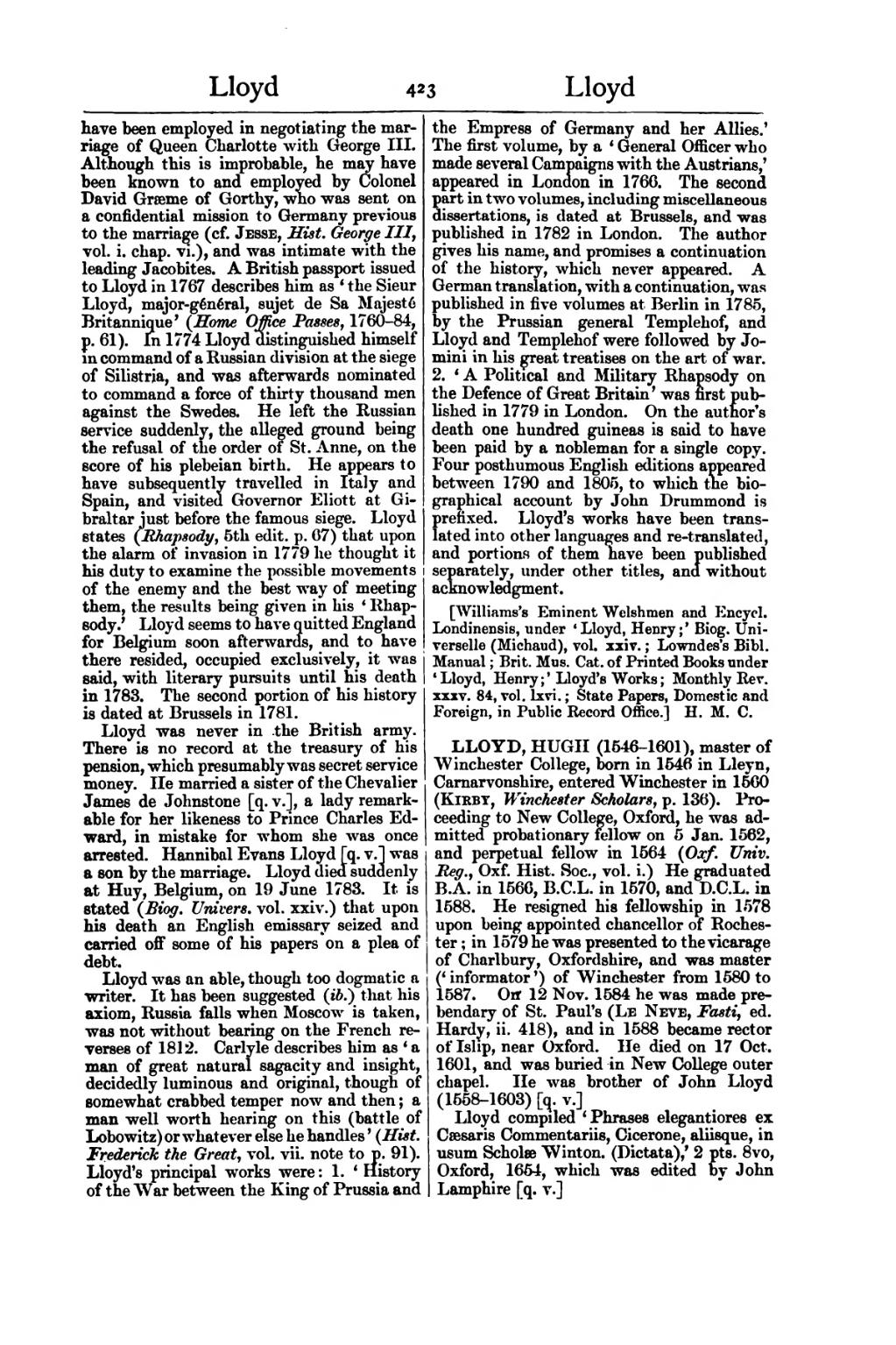have been employed in negotiating the marriage of Queen Charlotte with George III. Although this is improbable, he may have been known to and employed by Colonel David Græme of Gorthy, who was sent on a confidential mission to Germany previous to the marriage (cf. Jesse, Hist. George III, vol. i. chap. vi.), and was intimate with the leading Jacobites. A British passport issued to Lloyd in 1767 describes him as ‘the Sieur Lloyd, major-général, sujet de Sa Majesté Britannique’ (Home Office Passes, 1760–84, p. 61). In 1774 Lloyd distinguished himself in command of a Russian division at the siege of Silistria, and was afterwards nominated to command a force of thirty thousand men against the Swedes. He left the Russian service suddenly, the alleged ground being the refusal of the order of St. Anne, on the score of his plebeian birth. He appears to have subsequently travelled in Italy and Spain, and visited Governor Eliott at Gibraltar just before the famous siege. Lloyd states (Rhapsody, 5th edit. p. 67) that upon the alarm of invasion in 1779 he thought it his duty to examine the possible movements of the enemy and the best way of meeting them, the results being given in his ‘Rhapsody.’ Lloyd seems to have quitted England for Belgium soon afterwards, and to have there resided, occupied exclusively, it was said, with literary pursuits until his death in 1783. The second portion of his history is dated at Brussels in 1781.
Lloyd was never in the British army. There is no record at the treasury of his pension, which presumably was secret service money. He married a sister of the Chevalier James de Johnstone [q. v.], a lady remarkable for her likeness to Prince Charles Edward, in mistake for whom she was once arrested. Hannibal Evans Lloyd [q. v.] was a son by the marriage. Lloyd died suddenly at Huy, Belgium, on 19 June 1783. It is stated (Biog. Univers. vol. xxiv.) that upon his death an English emissary seized and carried off some of his papers on a plea of debt.
Lloyd was an able, though too dogmatic a writer. It has been suggested (ib.) that his axiom, Russia falls when Moscow is taken, was not without bearing on the French reverses of 1812. Carlyle describes him as ‘a man of great natural sagacity and insight, decidedly luminous and original, though of somewhat crabbed temper now and then; a man well worth hearing on this (battle of Lobowitz) or whatever else he handles’ (Hist. Frederick the Great, vol. vii. note to p. 91). Lloyd's principal works were: 1. ‘History of the War between the King of Prussia and the Empress of Germany and her Allies.’ The first volume, by a ‘General Officer who made several Campaigns with the Austrians,’ appeared in London in 1766. The second part in two volumes, including miscellaneous dissertations, is dated at Brussels, and was published in 1782 in London. The author gives his name, and promises a continuation of the history, which never appeared. A German translation, with a continuation, was published in five volumes at Berlin in 1785, by the Prussian general Templehof, and Lloyd and Templehof were followed by Jomini in his great treatises on the art of war. 2. ‘A Political and Military Rhapsody on the Defence of Great Britain’ was first published in 1779 in London. On the author's death one hundred guineas is said to have been paid by a nobleman for a single copy. Four posthumous English editions appeared between 1790 and 1805, to which the biographical account by John Drummond is prefixed. Lloyd's works have been translated into other languages and re-translated, and portions of them have been published separately, under other titles, and without acknowledgment.
[Williams's Eminent Welshmen and Encycl. Londinensis, under ‘Lloyd, Henry;’ Biog. Universelle (Michaud), vol. xxiv.; Lowndes's Bibl. Manual; Brit. Mus. Cat. of Printed Books under ‘Lloyd, Henry;’ Lloyd's Works; Monthly Rev. xxxv. 84, vol. lxvi.; State Papers, Domestic and Foreign, in Public Record Office.]
LLOYD, HUGH (1546–1601), master of Winchester College, born in 1546 in Lleyn, Carnarvonshire, entered Winchester in 1560 (Kirby, Winchester Scholars, p. 136). Proceeding to New College, Oxford, he was admitted probationary fellow on 5 Jan. 1562, and perpetual fellow in 1564 (Oxf. Univ. Reg., Oxf. Hist. Soc., vol. i.) He graduated B.A. in 1566, B.C.L. in 1570, and D.C.L. in 1588. He resigned his fellowship in 1578 upon being appointed chancellor of Rochester; in 1579 he was presented to the vicarage of Charlbury, Oxfordshire, and was master (‘informator’) of Winchester from 1580 to 1587. On 12 Nov. 1584 he was made prebendary of St. Paul's (Le Neve, Fasti, ed. Hardy, ii. 418), and in 1588 became rector of Islip, near Oxford. He died on 17 Oct. 1601, and was buried in New College outer chapel. He was brother of John Lloyd (1558–1603) [q. v.]
Lloyd compiled ‘Phrases elegantiores ex Cæsaris Commentariis, Cicerone, aliisque, in usum Scholæ Winton. (Dictata),’ 2 pts. 8vo, Oxford, 1654, which was edited by John Lamphire [q. v.]
